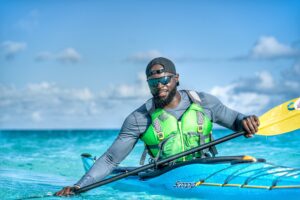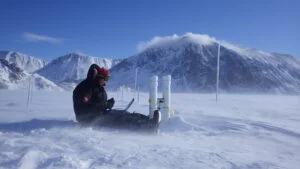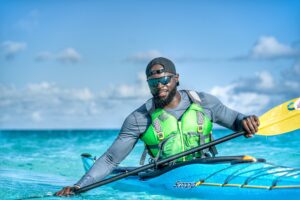
People & Culture
RCGS announces Mario Rigby as new Explorer-in-Residence
The eco-explorer discusses his new role with the Society and the importance of sustainable travel
- 1110 words
- 5 minutes
Exploration

Mario Rigby walked 12,000 kilometres across Africa — yes, walked — from South Africa to Egypt between November 2015 and early 2018, learning much along the way about local African communities. Later in 2018, he was recognized by the UN as part of its International Decade for People of African Descent initiative. And, this week, Rigby completed a 7,000-kilometre unsupported cycling expedition across Canada to raise awareness about sustainable transportation.
In 2020, he hopes to drive an electric car across Africa (becoming the first to do so) to highlight sustainable travel and renewable energy. Rigby spoke with Canadian Geographic about his journeys.
Watch: Explorer Mario Rigby on diversity in exploration
On why he cycled across Canada
I’m promoting inclusion and diversity in the outdoor industry and for people who don’t look the part of traditional outdoor enthusiasts. Growing up, I never saw anyone that looked like me, but outdoor activities are meant for everyone. That’s how we left Africa. The first explorers were Africans that decided to go through Europe, Asia and around the globe.
On being accepted as an explorer
That’s slow progress. There is a lot of hesitancy. It comes down to funding and that’s very hard to find. The Explorers Club and Mountain Equipment Co-op here in Canada have supported me. There are a lot of companies that I’ve requested help from that rejected me, but someone doing half of what I’ve done gets 10 times more than what I asked for. That happens regularly.
On becoming an explorer
I was born in the Turks and Caicos but was raised in Germany. My stepfather had a huge interest in the outdoors, so it was something I was naturally inclined to enjoy, too. African people have been doing this forever. You see women with baskets carrying firewood for five hours a day, starting as early as 4 a.m., and then they have to work once they’re finished doing that. And here we fetishize similar feats like they’re these fantastic achievements.
On insights from his Africa trek
What I learned while crossing Africa is mainly about the diversity of people there. There are 3,000 to 4,000 tribes, and the tribal structures are quickly dying away. I learned about their ingenuity, how Africans have the opportunity to basically leapfrog into the third industrial revolution. Everyone’s carrying a smartphone. People are mobile and exchanging money via phone. And renewable energy, solar panels and windmills are abundant everywhere. In North America, it’s going to be a lot harder to transition to a third industrial revolution.
On his “Project EVA”
Project EVA is essentially to drive an electric vehicle around Africa and become the first person to do so. But it needs a lot of funding. Right now, I have a team and we’re fixated on making it work for 2020. We want to promote renewable energy projects, as well as innovative technological projects that are happening in Africa.
On his future plans
Working with the UN Decade for People of African Descent initiative, we had the idea of retracing the West African slave trade route. I’ll be doing this human powered, starting from wherever the majority of my DNA is from. There will be five stages: Africa, the Atlantic Ocean, South America, the Caribbean and America. On each part, I’ll do special events and will find out what happened in those areas with slavery, and with masters and other people that lived among the slaves. It’s like closing the chapter of what it was like to be a slave and how that affects us today.
Are you passionate about Canadian geography?
You can support Canadian Geographic in 3 ways:

People & Culture
The eco-explorer discusses his new role with the Society and the importance of sustainable travel

Science & Tech
Celebrating Canadian Innovation Week 2023 by spotlighting the people and organizations designing a better future

People & Culture
L’écoexplorateur discute de son nouveau rôle au sein de la Société et de l’importance du tourisme durable

Wildlife
Canada jays thrive in the cold. The life’s work of one biologist gives us clues as to how they’ll fare in a hotter world.